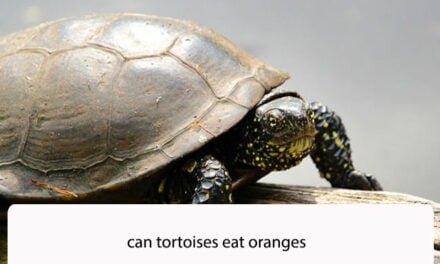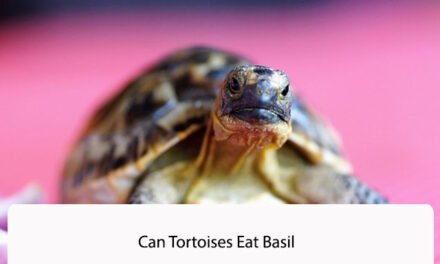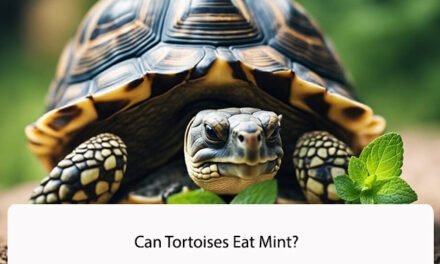Tortoises are known for their slow, steady pace and their love for leafy greens. However, many tortoise owners often wonder about the variety of foods they can feed their pets. One common question that arises is whether or not tortoises can eat pumpkin seeds.
Pumpkin seeds are a popular snack for humans, but can they be safely consumed by tortoises? The answer is yes, tortoises can eat pumpkin seeds. In fact, pumpkin seeds are a good source of protein and fiber for these reptiles. However, it is important to note that pumpkin seeds should only be given to tortoises in moderation, as they are high in fat and can cause digestive issues if consumed in large quantities.
As with any new food, it is important to introduce pumpkin seeds slowly and monitor your tortoise for any adverse reactions. It is also recommended to remove the outer shell of the seed before feeding it to your tortoise, as the shell can be difficult to digest. Overall, pumpkin seeds can be a healthy and tasty addition to your tortoise’s diet, as long as they are fed in moderation.

Understanding Tortoise Diet
Basic Dietary Needs
As tortoise owners, we must provide our pets with a balanced diet that meets their nutritional needs. Tortoises are herbivores, meaning that they primarily eat plants. In the wild, they have a varied diet that includes grasses, leaves, flowers, and fruits. However, not all plants are suitable for tortoises, and some can even be harmful.
Tortoises require a diet that is high in fiber, low in fat, and low in protein. They also need calcium and other minerals to maintain healthy bones and shells. A lack of calcium can lead to metabolic bone disease, a serious condition that can cause deformities and even death.
Common Foods in Tortoise Diet
There are many different types of plants that are safe for tortoises to eat. Some common foods in tortoise diets include:
- Grasses: Timothy, Bermuda, and other grasses are a good source of fiber for tortoises.
- Leafy greens: Kale, collard greens, mustard greens, and dandelion greens are all good choices.
- Vegetables: Squash, carrots, and sweet potatoes are high in fiber and low in protein.
- Fruits: Apples, pears, and berries are all safe for tortoises in moderation.
It is important to note that not all fruits and vegetables are safe for tortoises. Some, like avocado and rhubarb, are toxic and should be avoided.
In conclusion, understanding a tortoise’s dietary needs is crucial to providing them with a healthy and balanced diet. By offering a variety of safe plants and avoiding harmful foods, we can help ensure our tortoises live long and healthy lives.
Pumpkin Seeds and Tortoises
When it comes to feeding tortoises, it is important to provide them with a balanced diet that includes a variety of foods. Pumpkin seeds are one such food that many tortoise owners may wonder about. Here, we will discuss the nutritional value of pumpkin seeds and the possible health benefits for tortoises.
Nutritional Value of Pumpkin Seeds
Pumpkin seeds are a good source of protein, healthy fats, and fiber. They also contain important vitamins and minerals, including:
| Nutrient | Amount per 1 oz (28g) |
|---|---|
| Protein | 9g |
| Fat | 13g |
| Fiber | 1.7g |
| Vitamin K | 14% of the Daily Value (DV) |
| Phosphorus | 33% of the DV |
| Magnesium | 37% of the DV |
| Zinc | 14% of the DV |
While pumpkin seeds are a nutritious food, it is important to note that they are also high in calories and fat. Therefore, they should only be fed to tortoises in moderation as part of a balanced diet.
Possible Health Benefits
Pumpkin seeds may offer some health benefits for tortoises. For example, the high levels of magnesium and phosphorus in pumpkin seeds may help support bone health. Additionally, pumpkin seeds contain antioxidants that can help protect against cell damage.
However, it is important to note that there is limited research on the specific health benefits of pumpkin seeds for tortoises. Therefore, it is best to consult with a veterinarian or tortoise expert before adding pumpkin seeds to your tortoise’s diet.
In conclusion, pumpkin seeds can be a nutritious addition to a tortoise’s diet when fed in moderation. However, it is important to consider the overall balance of the tortoise’s diet and consult with a professional before making any significant changes.
Potential Risks of Feeding Pumpkin Seeds to Tortoises
Feeding pumpkin seeds to tortoises can be risky if not done in moderation. While pumpkin seeds are generally safe for tortoises to consume, there are a few potential risks to be aware of.
High Fat Content
Pumpkin seeds are high in fat, which can be harmful to tortoises if consumed in large quantities. A diet high in fat can lead to obesity and other health issues in tortoises. Therefore, it is important to feed pumpkin seeds to tortoises in moderation and as a treat rather than a staple food.
Choking Hazard
Pumpkin seeds are small and hard, which can make them a choking hazard for tortoises. If a tortoise eats too many pumpkin seeds at once or tries to swallow them whole, it can lead to choking or digestive blockages. To prevent this, it is best to crush or grind the pumpkin seeds before feeding them to tortoises.
Pesticides and Herbicides
Pumpkin seeds can be treated with pesticides and herbicides, which can be harmful to tortoises if consumed. It is important to ensure that the pumpkin seeds you feed to your tortoise are organic and free from any harmful chemicals.
In summary, while pumpkin seeds can be a tasty treat for tortoises, it is important to feed them in moderation and take precautions to prevent any potential risks. If you have any concerns about feeding pumpkin seeds to your tortoise, consult with a veterinarian who specializes in reptile care.

How to Feed Pumpkin Seeds to Tortoises
Preparation Methods
When feeding pumpkin seeds to tortoises, it is important to prepare them properly. Here are some methods to consider:
- Roasting: Roasting pumpkin seeds can make them more palatable for tortoises. Simply spread the seeds on a baking sheet and roast them in the oven at 350°F for 10-15 minutes, or until they are golden brown. Let them cool before feeding them to your tortoise.
- Grinding: Grinding pumpkin seeds into a powder can make them easier for tortoises to digest. Use a food processor or blender to grind the seeds into a fine powder, and then sprinkle the powder on top of your tortoise’s food.
- Soaking: Soaking pumpkin seeds in water overnight can help to soften them and make them easier for tortoises to eat. Drain the water before feeding the seeds to your tortoise.
Frequency and Quantity
While pumpkin seeds can be a nutritious treat for tortoises, they should not be fed in excess. Here are some guidelines to follow:
- Frequency: Pumpkin seeds should be fed to tortoises no more than once or twice a week.
- Quantity: The amount of pumpkin seeds to feed your tortoise will depend on its size and age. As a general rule, you should feed no more than 1-2 teaspoons of pumpkin seeds per feeding for a small tortoise, and up to 1-2 tablespoons for a larger tortoise.
Remember to always monitor your tortoise’s health and behavior when introducing new foods to its diet. If you notice any adverse reactions, stop feeding pumpkin seeds and consult with a veterinarian.
Alternatives to Pumpkin Seeds for Tortoises
Tortoises are herbivores and need a variety of vegetables and fruits in their diet to stay healthy. Pumpkin seeds are a good source of protein and healthy fats, but they should not be the only source of nutrition for your tortoise. Here are some alternatives to pumpkin seeds that you can include in your tortoise’s diet:
1. Leafy Greens
Leafy greens are an excellent source of vitamins and minerals for tortoises. You can feed your tortoise a variety of greens such as kale, collard greens, dandelion greens, and mustard greens. These greens are low in calories and high in fiber, which can help keep your tortoise’s digestive system healthy.
2. Vegetables
Vegetables are also an important part of a tortoise’s diet. You can feed your tortoise a variety of vegetables such as carrots, squash, sweet potatoes, and bell peppers. These vegetables are rich in vitamins and minerals and can help keep your tortoise healthy.
3. Fruits
Fruits are a great source of vitamins and minerals for tortoises. You can feed your tortoise a variety of fruits such as apples, bananas, strawberries, and blueberries. These fruits are rich in antioxidants and can help keep your tortoise’s immune system healthy.
4. Commercial Tortoise Food
Commercial tortoise food is also an option for tortoise owners. These foods are specifically formulated to meet the nutritional needs of tortoises. However, it is important to read the labels carefully and choose a food that is high in fiber and low in fat.
In conclusion, pumpkin seeds are a good source of nutrition for tortoises, but they should not be the only source of nutrition. Including a variety of vegetables, fruits, and commercial tortoise food in your tortoise’s diet can help ensure that they are getting all the nutrients they need to stay healthy.
Conclusion
In conclusion, pumpkin seeds can be a healthy snack for tortoises when given in moderation. They are a good source of fiber, protein, and essential fatty acids. However, it is important to note that pumpkin seeds should be given in small amounts and as a treat, not as a staple food item.
It is also important to ensure that the pumpkin seeds are fresh and have not been treated with any harmful chemicals or additives. If purchasing pumpkin seeds from a store, it is recommended to choose organic, unsalted, and unroasted options.
While pumpkin seeds can be a nutritious addition to a tortoise’s diet, it is important to remember that they should not be the only source of nutrition. A balanced diet consisting of a variety of vegetables, fruits, and protein sources is essential for a healthy and happy tortoise.
Overall, with proper moderation and care, pumpkin seeds can be a safe and healthy snack option for your tortoise.

Frequently Asked Questions
What vegetables can a tortoise eat?
Tortoises can eat a variety of vegetables, including leafy greens, carrots, squash, and bell peppers. It is important to provide a balanced diet for your tortoise and to avoid feeding them too much of any one type of vegetable.
Can tortoise eat yellow squash?
Yes, yellow squash can be a good addition to a tortoise’s diet. It is low in oxalates and high in nutrients, making it a healthy option for your tortoise.
Can tortoises eat grapefruit?
No, tortoises should not eat grapefruit. Grapefruit contains high levels of citric acid, which can upset a tortoise’s digestive system and lead to health issues.
Can tortoises eat lychee?
No, tortoises should not eat lychee. Lychee contains toxins that can be harmful to tortoises and cause digestive problems.
Is pumpkin safe for tortoises?
Yes, pumpkin is safe for tortoises to eat. They can eat both the flesh and seeds of the pumpkin. However, as with all foods, it should be given in moderation as part of a balanced diet.
What should I not feed my tortoise?
There are several foods that should not be fed to tortoises, including avocado, rhubarb, and chocolate. These foods can be toxic and cause serious health problems for your tortoise. It is also important to avoid feeding them foods that are high in sugar or salt.




